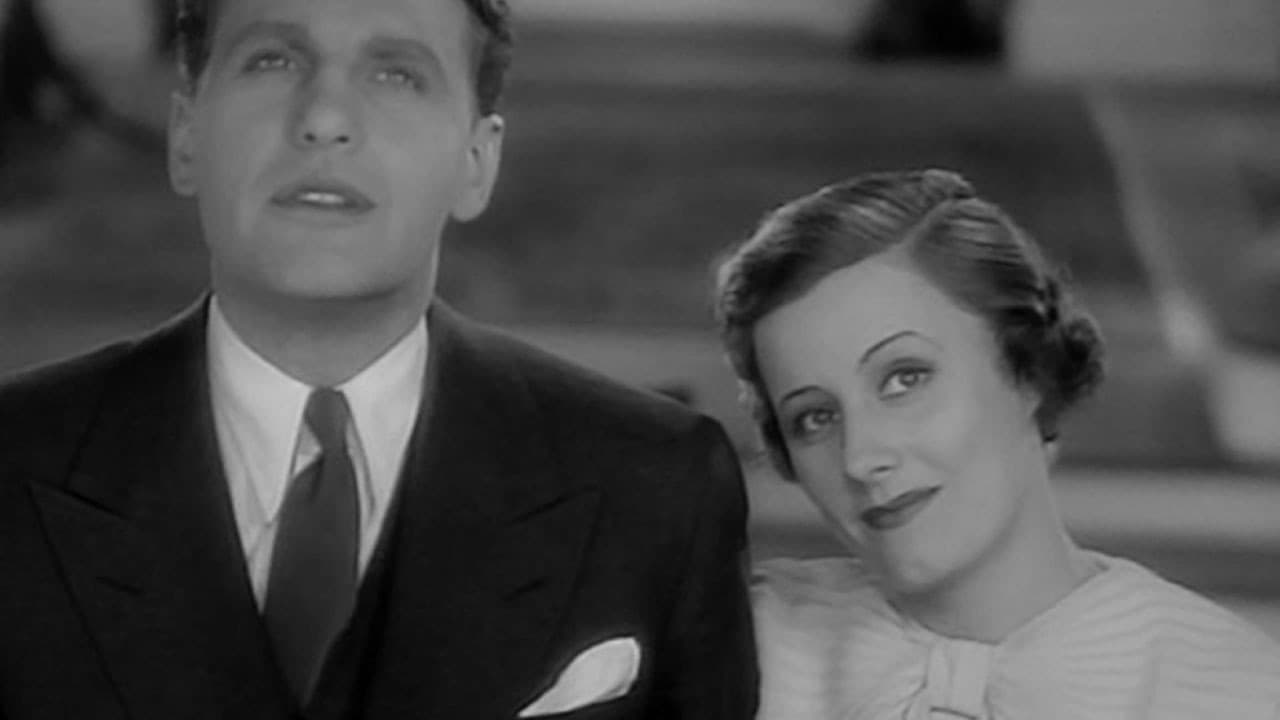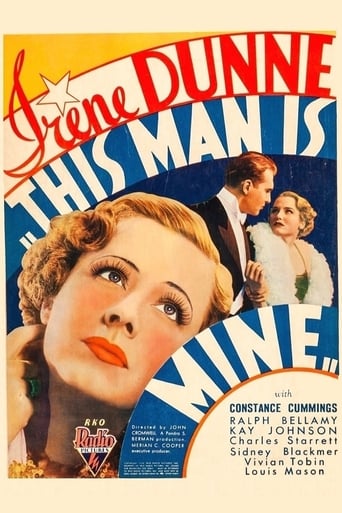

The idle rich have little to occupy their time but playing cards and seducing each other's spouses. At least that is what the characters in "This Man is Mine" suggest. This short tired tale of marital infidelity, adapted from a play, retains its staginess and does not merit the presence of Irene Dunne in the central role. Despite her talent and beauty and voice, Dunne as Tony Dunlap fails to convince viewers that her character would try to save a worthless marriage to Jim Dunlap, played by Ralph Bellamy. Bellamy evidently has retained suppressed feelings for a former flame throughout his marriage to Dunne, with whom he has had a young son. When the former girlfriend arrives on the scene to rekindle her romance with Bellamy, the film's fragile grip on credibility crumbles. Although Constance Cummings as Francesca is an amusing conniving tart, the transparency of her character and motives makes Bellamy look like an utter idiot when he returns her advances. Viewers may be forgiven for shouting "you blithering fool" and throwing tomatoes at the screen when Bellamy falls for Cummings's tricks, especially when the other characters on screen easily see through her. Bellamy's character must have inherited wealth, because there was no way this gullible dimwit could make his way in the business world. As a father, he is ready to toss away his child for a shallow man hunter. He does not deserve Irene Dunne's attention, let alone her hand and devotion. By the final frame, "This Man is Mine" has descended into completely incredible nonsense. Only the performances of Dunne and Cummings and the handsome presence of future western star Charles Starrett offer any reason to see this annoying trifle.
... View MoreThis film was described as a comedy on the cable station listing, and with a cast that includes those great screwball stars Irene Dunne and Ralph Bellamy (see "The Awful Truth"), I expected a light and zany marital farce. Far from it. Despite the nonstop string of quips, clever insults, and arch comments, this film is at its core a rather cynical and serious take on the institution of marriage. Given that it was directed by John Cromwell, I guess I should have anticipated that there'd be something more substantial lurking under the glossy comic veneer.Things start straying from the formula-comedy path in the very first scene. When hubby Ralph talks to his doting wife Irene, the expected marital banter soon devolves into a rather distasteful display of selfish rudeness on his part. There's not the slightest glimpse of any qualities that would make his wife so devoted to him. His subsequent behavior with old flame Constance Cummings stamps him indelibly as a cad and a fool. Still, I expected him to come to his senses after one night's infidelity and do something noble to win back Irene. But he kept on behaving like such a louse that I found myself rooting for her not to take him back.... even though I knew this was not likely to happen in a Hollywood film from this era, especially when the couple in question had a child.Another noteworthy departure from the standard-issue Hollywood formula is the affair between bad-girl Constance Cummings' character and the character portrayed by Sidney Blackmer. It's made quite explicit that she had picked him up under disreputable circumstances and that they have some sort of kinky relationship going on. Blackmer manages to show us a man who is suave, creepy, and admirable in one package.(He may behave amorally, but at least he's honest about it.)Meanwhile, I was surprised and delighted to hear two strong, intelligent, independent-minded female characters (Irene Dunne's and Kay Johnson's) expressing some rather enlightened ideas about marriage and womanhood. No doubt this had something to do with the fact that both the screenplay and the play upon which it was based were written by women. As the film progressed, I began to hope for something truly revolutionary: that Irene would dump her unworthy husband even if he decided to return to her. If I'm not mistaken, she looks like she's not completely surrendering to him in the final clinch that closes the film. The ending is not the definitive feminist statement I was hoping for, but it's just ambiguous enough to leave the door open for that sort of interpretation if you're inclined to see it that way. It's a great illustration of how "Pre-Code" signifies much more than overt sexuality and "immoral" behavior; had "This Man Is Mine" been made just one year later, there's no doubt Irene would have pulled the noble self-sacrifice routine to win back her boorish husband, if only for the sake of their child.This is an original, deftly-written film that keeps you guessing throughout. I appreciated the attention given to creating interesting, complex characterseven the minor ones have distinctive personalities and quirks. And hooray to the scriptwriter, director, and Ralph Bellamy for not trying to show in the end that his character is a great guy underneath it all! Performances by just about the entire cast are nuanced and compelling, with the three leading ladies meriting special praise.Those who view this film as a lesser version of "The Women" are I think missing the point.... there's a lot more going on here than the bitchy (albeit well-written) catfights. Give it another look and see if you agree.
... View MoreFast paced and pretty good dialogue throughout, plus runs about 1 hr 15 min.The women are given the best lines -- sharp, funny, and often catty. Though their characters are quite minor to the story, I enjoyed the lines between husband and wife Slim and Rita, or "Cookie" and "Pookie" as they called each other. It was quite funny to hear them call each other by such cute little pet names, followed by a jab or barb or criticism! I don't think they said one nice thing to each other! The other supporting couples in the flick were always snapping at each other too -- Bea and Jud, and Fran and Mort.The two main characters, Toni and Jim, are very much in love and exhibit some nice friendly banter at the beginning of the movie. This doesn't last for long as Jim's ex-fiancé, Fran, breezes into town, freshly divorced with a new dude already lined up (Mort) and setting her sights on winning Jim back ... not permanently, just for a night. Constance Cummings is great as Fran! Toni suffers through Jim's infidelity and even forgives him as she wants to save her marriage and her family (they have a 2-yr-old boy). Eventually, however, she decides she's had enough and files for divorce.What's interesting (and one of the reasons I like to watch these older movies) is the glimpse we get into how things were done back in the day. Jim asks Toni where she filed for divorce, and is aghast to learn she filed in the state they live in. From what I can gather, she could've run off to Reno (as Fran did, and as so many women in films from the 1930s did, and get what amounts to a 'no fault' divorce). But, since Toni filed in the state they lived in (New York?) where there was only one grounds for divorce - infidelity - this required her to name a 'correspondent' (i.e., the outside party whom the spouse cheated with). Fran is quite upset to learn that Toni has filed in state and has named her as the correspondent. I really enjoy these little snippets into how life used to be long before I was born. It adds to the enjoyment of the movie somehow, a little history lesson along with my entertainment.Anyways ... back to the movie. Fran doesn't want to be involved in a scandal and, in addition, has since learned that Mortie is stinking rich, so she ups and marries him, hoping this will dissuade Toni from divorcing Jim (and naming Fran as correspondent). Jim comes crawling back to Toni and the movie ends with them kissing (presumably Toni's going to take him back). I'd have liked to see Toni kick Jim to the curb, but alas it looks like she's going to take him back instead.Toni was played wonderfully by Irene Dunn, and Jim was played by Ralph Bellamy. It was nice to see what the old coot from Trading Places looked like back when he was a young man.Pretty good, not great, but I wasn't disappointed that I watched it either. This movie appears on TCM (Turner Classic Movies) every once in a while.
... View MoreI probably saw this on American Movie Classics and did not tape it, not realizing that my chance would not come again. This movie is fun. Irene Dunne was in the early years when she was still playing heroic roles and here she plays the wife who is done wrong. It was refreshing to see Ralph Bellamy who so often played the put upon boy-friend who lost the girl to Cary Grant, as instead the object of desire fought over by the two women. But as I remember the movie it is Constance Cummings who gets to steal the movie because she is given some of the most interesting reasons for husband stealing, forgiveness of same and even has the audacity to lecture Irene Dunne -in a very sophisticated, urbane way of course. I wish it would come out of DVD. Failing that I wish Turner Classic Movies or AMC would run it again so I can tape it.
... View More